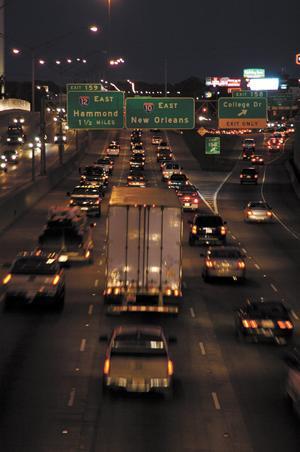A proposal to assess fees for traffic impact on all new developments within the city-parish will go before the East Baton Rouge Metropolitan Council on Wednesday where the proposal is expected to face steep opposition and heated debate.
Pete Newkirk, Department of Public Works director, said the proposed traffic impact fee will pay to help alleviate traffic congestion caused by new developments, as opposed to paying for the creation of new roadways.
Michael McDuff, Baton Rouge Growth Coalition executive director, said the new fee proposal is a good idea.
The fee could support improvements on existing roadways, traffic lights and turning lanes.
“[The Baton Rouge Growth Coalition] has been trying to get behind the whole concept of a traffic impact fee to help address the transportation and infrastructure needs in and around the city of Baton Rouge,” McDuff said. “[Currently] only the large developments are being taxed on a traffic impact fee. We believe everybody ought to be addressed with a traffic impact fee and pay it fairly.”
But some feel the new fees will make housing unaffordable passing the cost of the fees from the developers down to the consumers.
Herb Gomez, Greater Baton Rouge Association of Realtors executive vice president, said the fees are not always needed and would fall on the backs of consumers as an additional tax burden.
“It essentially becomes a tax [on the consumer] because that amount will be passed from the developer to the realtor, who will then pass it on to the purchaser of the property,” Gomez said.
Councilman Darrell Ourso said passing fees down to the consumers will cause them to essentially pay the impact fee twice.
“It’s a multiplication effect,” Ourso said. “If you build new houses, new businesses will spring up nearby. So you’re not only paying the [impact] fee passed down from the developer to you on your house, but you’ll also pay at the new dry cleaners, the new restaurants and the new gas stations.”
Tiffany Victorian, communications disorders junior, said traffic is a problem in Baton Rouge, but does not support a new fee.
“It makes sense if the owner of the establishment pays the taxes,” Victorian said. “Because you’re pretty much paying for the location and the convenience of the location. But as a consumer, I don’t like the idea of having to pay for it eventually. I just don’t think [traffic is] bad enough for use to need to pay more.”
Gomez said the increased cost of living could force working class people out of East Baton Rouge Parish and into the surrounding parishes in order to find more affordable housing options.
“[There is] a problem with affordability here as compared to Livingston [Parish] now,” Gomez said. “You’d be amazed at how many working class people – your police, your teachers, your firemen – live in Livingston Parish as it is. They can’t afford Baton Rouge now, and if you add [fees] to the cost of housing, living in Baton Rouge becomes even less affordable.”
Newkirk said the new fees would be affordable, averaging between $700 and $800 dollars per new residential building. The fees for all developments within East Baton Rouge Parish could generate up to $4 million – enough revenue to pay for the expected rate of infrastructure developments.
Lynda Evans, Capital Region Builders executive vice president Association, said the new fees are unfair.
Evans said the burden of paying rising construction costs compounded with new fees is too much.
“We feel like it’s a hidden tax on people trying to get a new home,” Evans said. “Construction cost have already risen so high since the hurricanes. We’re looking at a 20 percent increase. [The fees] are just like anything else – when a business occurs an expense, it gets tacked on to the consumer.”
Ali Madani, engineering freshman, said he does not mind a new fee but said it is not an immediate problem.
“I don’t mind the idea of a new [fee],” Madani said. “But I don’t think traffic is enough of a problem to make it an immediate necessity to fix with a fee.”
—Contact Nicholas Persac at [email protected]
Metro Council to debate traffic tax proposal next week
July 18, 2007

Traffic backs up on Interstate 10 near the College Drive interchange. The proposed Baton Rouge corridor would help relieve traffic on the city’s freeways.





